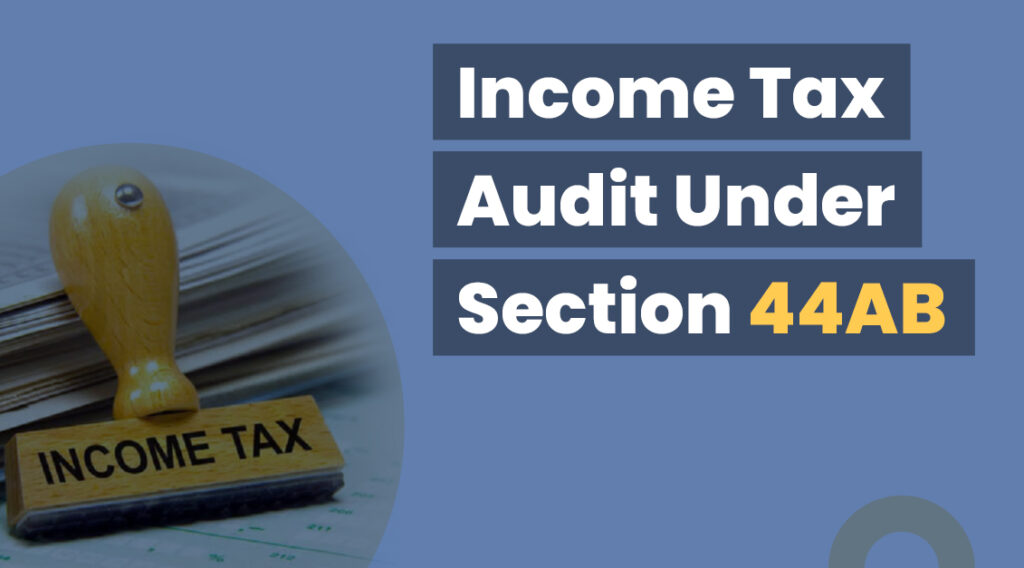Filing ITR under Sec 44AB and managing the tax audit ensures compliance for businesses and professionals with high turnovers. With tax collections surging—₹2.10 lakh crore in GST in April 2024, understanding Section 44AB is vital. What does it entail, and how can you navigate it? Let’s break it down.
What Is Section 44AB and Tax Audit?
Filing ITR under Section 44AB is a mandatory requirement for certain taxpayers in India. This section pertains to the audit of accounts of individuals, Hindu Undivided Families (HUFs), and firms (other than LLPs) who are carrying on business or profession. The primary objective is to ensure transparency and compliance with the Income Tax Act.
A CA conducts a tax audit and it is essential for taxpayers whose turnover or gross receipts exceed specified limits. Failure to comply can lead to penalties and other legal consequences.
Who Needs to File ITR Under Section 44AB?
Section 44AB applies to individuals, HUFs, and firms (other than LLPs) carrying on business or profession. A tax audit is mandatory if:
- Business Turnover: Exceeds ₹1 crore in a financial year. This limit increases to ₹10 crore if cash receipts and payments are less than 5% of total receipts and payments.
- Professional Gross Receipts: Exceed ₹50 lakh in a financial year.
- Presumptive Taxation: Taxpayers under sections 44AD, 44ADA, or 44AE who declare profits lower than the prescribed limits or incur losses.
Additionally, if an individual is required to get their accounts audited under any other law, they are also mandated to undergo a tax audit under Section 44AB.
The Tax Audit Process: Forms and Deadlines
To manage filing ITR under Section 44AB and the tax audit process in India:
- Appoint a CA: Engage a CA by June to prepare books, per ICAI guidelines.
- Maintain Records: Keep ledgers, invoices, and bank statements, also ensuring GST reconciliation, up-to-date.
- Form 3CA and 3CD: If your accounts are audited under any other law, you submit Form 3CA (Audit Report) and Form 3CD (Statement of Particulars).
- Form 3CB and 3CD: If your accounts are not audited under any other law, Form 3CB (Audit Report) and Form 3CD are submitted.
- Review and Acceptance: After submission, the taxpayer must review and accept the audit report through their e-filing portal.
The due date for filing the tax audit report is typically September 30 of the assessment year. However, for taxpayers involved in international transactions, the due date is October 31.
Benefits of Filing:
Filing under this Section also ensures accurate tax reporting, reducing scrutiny risks. Audits enhance credibility with banks and investors, aiding loan approvals—SME credit grew 20% in 2024. They also identify tax-saving opportunities, like deductions under Section 80JJAA. In addition, timely audits avoid penalties of ₹1.5 lakh or 0.5% of turnover, per Section 271B. In 2024, 10.23 crore SIP accounts reflected disciplined financial planning, thus complementing audit rigor.
Consequences of Non-Compliance:
Failing to comply with the tax audit requirements under Section 44AB can lead to significant penalties:
- Penalty: A penalty of 0.5% of the total sales, turnover, or gross receipts, subject to a maximum of ₹1.5 lakh.
- Defective Return: Non-submission of the audit report renders the ITR defective, thus leading to potential legal consequences.
However, penalties may be waived if the taxpayer can demonstrate a reasonable cause for the delay, such as natural calamities or loss of records due to unforeseen circumstances.
Conclusion:
In conclusion, filing ITR under Section 44AB and managing the tax audit process in India ensures compliance and boosts financial credibility, but demands timely action. By following the prescribed audit process and filing the ITR accurately and timely, you can ensure compliance and avoid potential penalties. Ready to audit smarter? Explore more tax insights now!
– Ketaki Dandekar (Team Arthology)
Read more about Filing ITR under Sec 44AB and Managing the Tax Audit here – https://cleartax.in/section-44ab
